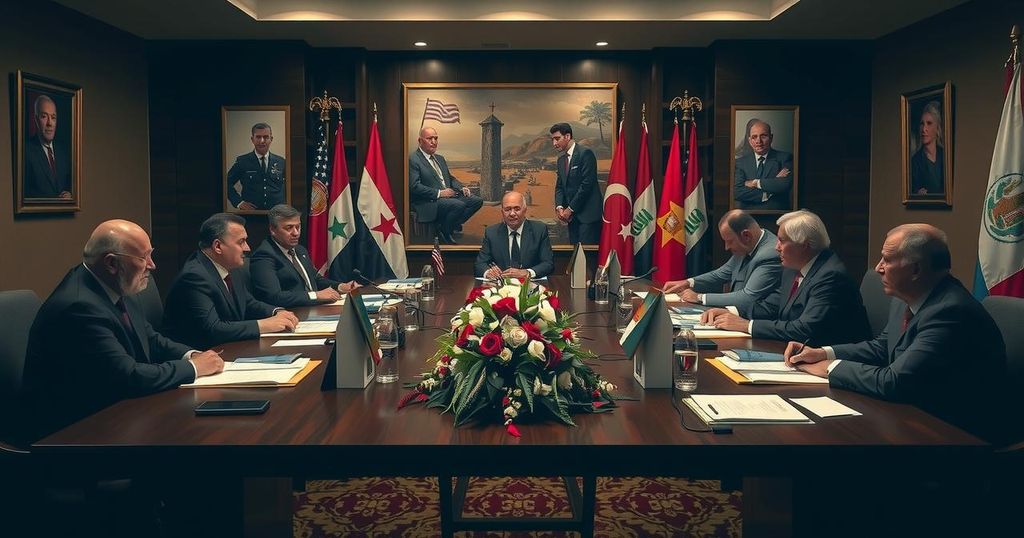Iran’s Diplomatic Support for Syria Amid Ongoing Military Challenges

Iran’s top diplomat is visiting Damascus to support Assad’s regime amid Islamist militants capturing Aleppo, reflecting Tehran’s backing as the Syrian government faces significant territorial and strategic challenges. Amidst regional dynamics and foreign interventions, the situation remains volatile with ongoing confrontations and airstrikes targeting opposition areas.
Iranian Foreign Minister Abbas Araghchi is set to visit Damascus, signaling Tehran’s unwavering commitment to support the Syrian regime amidst its ongoing struggle against Islamist militant advances that have led to the fall of Aleppo, the nation’s second largest city. The visit, scheduled for Sunday, comes after Islamist fighters, particularly Hayat Tahrir al-Sham (HTS), rapidly captured key areas in north-western Syria. Araghchi emphasized Iran’s solidarity with President Bashar al-Assad, asserting, “We firmly support the Syrian army and government,” reflecting the Iranian regime’s reliance on foreign alliances to maintain stability.
As Assad grappled with the repercussions of this sudden shift in control, he reemerged after several days of absence, engaging regional allies in critical discussions from capitals including Baghdad and Abu Dhabi. Notably, Assad indicated to Emirati President Mohamed bin Zayed al-Nahyan that his government is capable of resisting the insurgent offensive with the support of its allies.
The Syrian regime’s historical dependence on foreign intervention is evident, as seen during the 2016 conflict to reclaim Aleppo, where Russian military assistance played a pivotal role. This reliance has escalated tensions, particularly as Israel has intensified strikes against Iranian interests within Syria. Following the recent territorial losses, senior diplomats from both Russia and Iran expressed grave concerns about the escalating situation.
Iranian officials assert that the offensive by HTS is fueled by external influences, specifically attributing blame to the United States and Israel. In contrast, the U.S. National Security Council disavowed involvement in the conflict, criticizing the Assad regime’s inability to maintain its position due to external dependencies. The situation on the ground has swiftly evolved, with various factions vying for control over recently vacated territories.
Amidst this turmoil, substantial airstrikes by Syrian and Russian forces have targeted opposition-held zones, including Idlib, resulting in civilian casualties and further complicating the humanitarian landscape. Reports of these strikes have underscored the continued volatility of the region, as local defense groups attempt to address the aftermath of ongoing hostilities.
With counter-offensives shaping up in northern Hama, the Assad regime claims it is prepared to recover lost territories, showcasing resilience despite a turbulent environment marked by extensive battles and regional instability.
The recent developments in Syria highlight the fragility of the Assad regime as Islamist militants continue to capitalize on the ongoing conflict. This marks a critical moment as Aleppo’s loss represents not just a territorial shift, but a potential turning point in the Syrian civil war, which has been ongoing since 2011. The Assad government has historically depended on military support from allies like Iran and Russia, with its strategies gaining international scrutiny amid rising tensions involving Israel and the U.S. The mix of foreign influence and internal strife continues to shape the evolving dynamics in the region.
The anticipated visit of Iranian Foreign Minister Abbas Araghchi to Syria underscores the ongoing complexities within the region, particularly following the recent loss of Aleppo to insurgents. Assad’s regime remains heavily reliant on foreign support, especially from Iran and Russia, to navigate the escalating challenges posed by militant offensives. As various factions compete for control, the situation highlights the persistent instability in Syria, raising critical implications for both regional security and international diplomacy.
Original Source: www.theguardian.com






